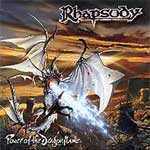Rhapsody Power Of The Dragonflame
By
Daniel Höhr,
European Correspondent
Friday, April 26, 2002 @ 3:28 PM
| (LMP/ SPV)
|
 |
|
 Italy was Europe's cultural cradle back in the late Middle Ages. From there the Renaissance spread over Europe, the Italian sonnet became the role model for the most popular form of poetry in Shakespeare's England, the visual arts in Italy influenced basically all European schools of art and Italian composers wrote music that was soon to change the complete music scene on the Old Continent. Until the present day, Italian has been the lingua franca in classical music. For good reason. Composers like Garibaldi, Vivaldi, Salieri, Rossini, Bellini, Totti -- oh shit, I think he's a football player -- Verdi, Puccini and many others stand for a tradition without which the history of music would fill a leaflet and not libraries.
Italy was Europe's cultural cradle back in the late Middle Ages. From there the Renaissance spread over Europe, the Italian sonnet became the role model for the most popular form of poetry in Shakespeare's England, the visual arts in Italy influenced basically all European schools of art and Italian composers wrote music that was soon to change the complete music scene on the Old Continent. Until the present day, Italian has been the lingua franca in classical music. For good reason. Composers like Garibaldi, Vivaldi, Salieri, Rossini, Bellini, Totti -- oh shit, I think he's a football player -- Verdi, Puccini and many others stand for a tradition without which the history of music would fill a leaflet and not libraries.
Why this lecture? Well, despite all the talent in that country, Italy has not been known as a particular heavy metal nation, but then again quality is better than the proverbial quantity and the proof is Rhapsody. Ever since the release of their debut Legendary Tales back in 1997, the Italian four-piece have been an established name on the international power metal scene. The new album, Power Of The Dragonflame, takes you once again on a journey back in time, through the ages and to worlds far beyond our imagination. Thematically, it concludes Rhapsody's Emerald Sword Saga.
It seems to be a must for bands of this genre to open their albums with a Carmina Burana-style intro with bombastic orchestration plus choir, and "In Tenebris" (Latin: in darkness) is no exception. The reprise at the end of the album, after the nineteen-minute epic "Gargoyles, Angels of Darkness," gives the album a musical framework and effectively rounds it off. In each of the altogether nine songs, Rhapsody show their talent at creating rhythmical subtleties, elaborate arrangements, driving riffs, effective orchestration, medieval-style melody lines and intrumental parts and melodic metal anthems.
The first song, "Knightrider Of Doom" is a straightforward power metal hymn, followed by the title track, which stylistically recalls very much Blind Guardian. A real gem is "The March Of The Swordmaster" with its medieval-type intrumental opening, complete with violins, flutes, acoustic guitar and percussion. The double bass onslaughts and excellent guitar work of the speedy neckbreaker "When Demons Awake" is followed by "Agony Is My Name" at similar speed but with the odd flute and harpsichord interlude woven into it. The use of the Italian language cannot be anymore appropriate than in the ballad "Lamento Eroico" (heroic lament), where singer Fabio Lione shows that he is much more than "just another great power metal vocalist." This guy could sing Italian opera! Well, in fact he does. This track will most definitely send shivers down the spine of the hardest metal heads, if not bring tears into their eyes.
"Steelgods Of The Last Apocalypse" is yet another example of how well the blend of powerful metal attacks and classical-style melody lines coupled with effective orchestration can work if done by musicians with talent and the right feeling for the music. "The Pride Of The Tyrant" is once again marked by speed and breathtaking vocal lines. A real epic piece of music is "Gargoyle, Angels of Darkness." The number falls into three parts -- 'Angeli di Pietra Mistica' ('angels of the mystic stone' if my Italian is correct ), 'Warlords' Last Chance,' '... and the legend ends...' -- and combines all the musical strengths of Rhapsody. It is undoubtedly the highlight of the album and if there are "rock songs" or "metal tracks" that deserve the title "composition," this one is certainly amongst them and very high up on the list. Without falling to pieces, "Gargoyle..." blends classical passages, great orchestration with kick-ass metal. What a great piece of music!
All in all, on Power Of The Dragonflame, Rhapsody present about 60 minutes of outstanding symphonic metal. The only slight complaint I have is that on some of the tracks there are too many stops and goes, which make it difficult for the songs to develop and difficult for the listeners to find their way through. Especially "Knightrider Of Doom" could do with a bit more continuity, but having said that, it's a matter of getting used to it.
Produced by Sascha Paeth and Miro (Heavens Gate, Virgo) in the Gate Studios in Wolfsburg, Germany, the album has a top-sound with both clarity and enormous power.
So off you go, switch off your computer, polish your sword and get the new Rhapsody album. Italy rules.
****1/2

|




